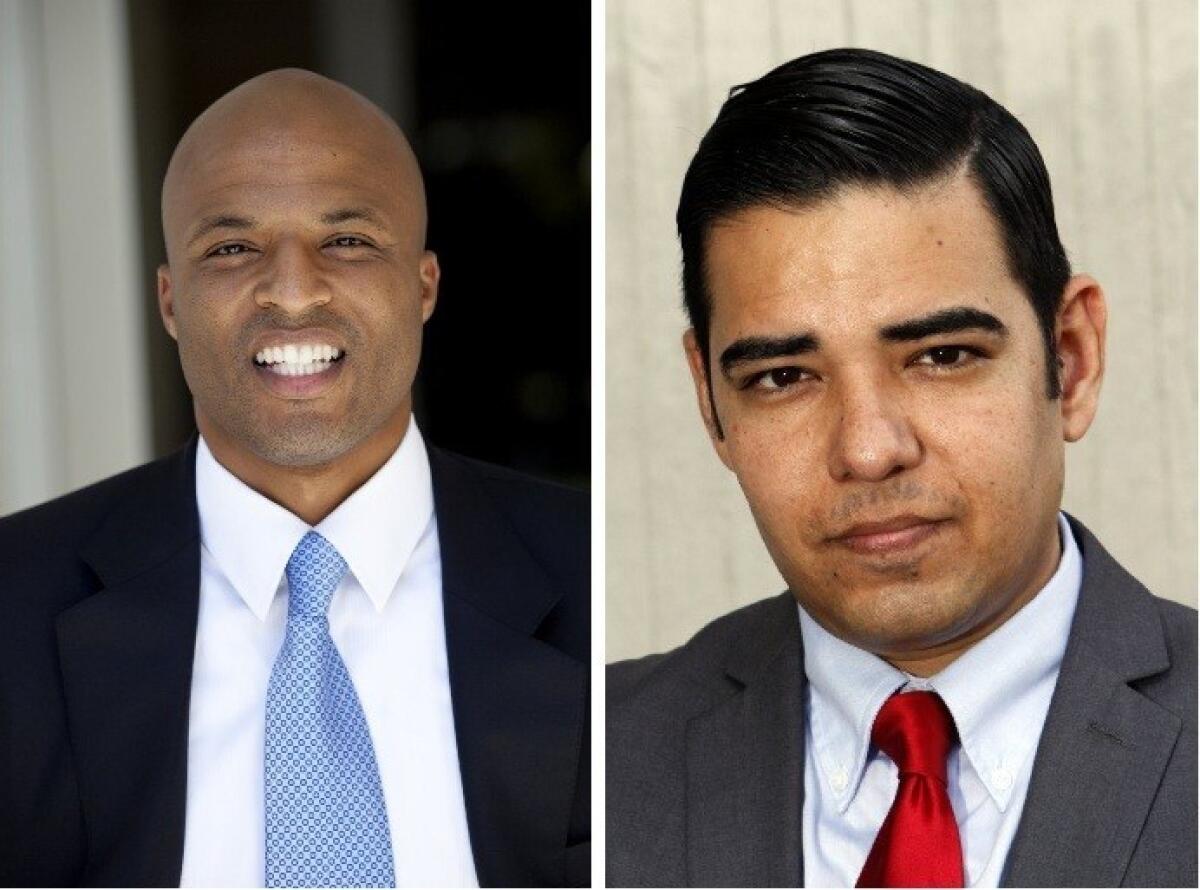Long Beach headed to mayoral runoff; voters approve marijuana tax

- Share via
Councilman Robert Garcia and real estate investor Damon Dunn held off heavily favored Assemblywoman Bonnie Lowenthal in Tuesday night’s Long Beach mayoral election, emerging as the top two candidates who will advance to a runoff.
Unofficial tallies from the city clerk’s office showed Garcia leading the pack with 25.4% of the vote, and Dunn close behind with 22.3%. Lowenthal, a Democrat whose district includes Long Beach, garnered 19.6%.
In addition to the mayor’s office, Tuesday’s ballot also included races for city attorney and a majority of Long Beach’s nine City Council seats, setting the stage for one of the most significant shake-ups in city politics in more than a decade.
But all eyes have been on the mayor’s race, in which a total of 10 candidates -- many of them political heavyweights and city insiders -- have been locked in an expensive battle.
More than $1.7 million was raised in the primary, setting a city record.
If elected, Garcia would be the city’s first Latino and openly gay mayor. He received a boost from outgoing Mayor Bob Foster, who endorsed Garcia after announcing last year that he would not seek a third term.
Dunn, a relative newcomer to the city, is a former NFL player with a compelling rags-to-riches story who has pitched his business acumen as a potential asset for City Hall. His campaign, which received the endorsement of the Long Beach Chamber of Commerce, was largely self-funded, with $445,000 of his large war chest coming out of his own pocket. If elected, he would be Long Beach’s first black mayor.
Because neither candidate received more than 50% of the vote, they will go head-to-head in a June runoff.
Lowenthal, meanwhile, suffered the first election loss of her political career. In fact, it was the first election loss for any of the Lowenthals. Her ex-husband, Alan Lowenthal, first ran for Long Beach City Council in 1992, and served in the Legislature before getting elected to Congress in 2012. The two are well known to many voters in Long Beach, and have regularly endorsed each other in their political races.
Suja Lowenthal, their former daughter-in-law, currently sits on the City Council and last year abandoned her run for mayor to campaign for Bonnie’s assembly seat.
One of their sons, Los Angeles County Superior Court Judge Daniel Lowenthal, is Suja’s ex-husband.
Also running for mayor were Councilwoman Gerrie Schipske, Long Beach City College Trustee Doug Otto, nonprofit executive Jana Shields, state auditor Mineo Gonzalez, businessman Steve Mozena, auto detailer Richard Camp and businessman Erick Rock.
The election also decided three of the five open council seats outright, with Orange County Deputy Dist. Atty. Suzie Price winning in District 3, community college trustee Robert Uranga taking District 7, and Rex Richardson, chief of staff to Councilman Steven Neal, winning in District 9.
Also, Measure A, a proposal to tax medical marijuana sales, passed, with 74% voting in favor and 26% voting against. However, the tax would only take effect if current efforts to draft city regulations on pot shops are successful.
Despite high levels of interest in the mayoral race, results indicated a very low turnout for Tuesday’s election, with only about 14% of registered voters in Long Beach casting ballots, according to the city clerk’s office.
Earlier in the week, City Clerk Larry Herrera had predicted between 25% and 30% turnout.
christine.maiduc@latimes.com
Twitter: @cmaiduc
More to Read
Sign up for Essential California
The most important California stories and recommendations in your inbox every morning.
You may occasionally receive promotional content from the Los Angeles Times.











